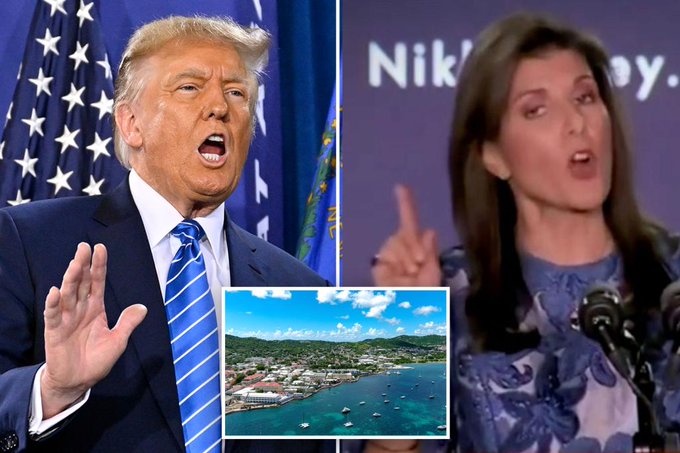CHARLOTTE AMALIE — For most of us, an island getaway in winter is the perfect vacation. For surrogates of Donald Trump and Nikki Haley, it’s serious business.
The U.S. Virgin Islands’ new caucus system will provide Trump, 77, and Haley, 52, the first opportunity to go head-to-head post-New Hampshire primary — meaning the territory is getting more scrutiny than ever in the election process.
Neither Trump nor Haley has visited our American Caribbean outpost, and neither are likely to do so ahead of the February 8 caucus.
However, the islands have been the focus of a frenzy of strategizing and Zoom calls as the rivals fight for all four delegates up for grabs.

The caucus logistics
The US Virgin Islands election is technically the third-in-the-nation contest, since it’s four hours ahead of Nevada, which will hold its Republican caucus on the same day.
The Republican National Committee reduced the number of delegates representing the islands from nine to four after the territorial GOP implemented ranked-choice voting — violating RNC rules that caucuses held before March 15 must allocate delegates proportionally to the number of votes each candidate receives.
The USVI, like other American territories, doesn’t take part in the general election, meaning its caucus is more important than ever before, according to Republican Party in the Virgin Islands Executive Director Dennis Lennox.
“The Virgin Islands has never seen this kind of attention in any previous cycle, either on the Democratic side or on the Republican side,” Lennox said.
“There is no question breaking the RNC calendar gave Virgin Islanders a relevant say and has ensured the success that we’ve seen.”
The early date also encouraged GOP presidential candidates — most of whom are no longer in the race — to pay $20,000 to register for the ballot.
Florida Governor Ron DeSantis, biotech mogul Vivek Ramaswamy, businessman Perry Johnson and former New Jersey Governor Chris Christie will all be listed as voting options despite dropping out weeks or months ago.
Under the caucus’ ranked-choice system — similar to those used in New York City, Alaska and Maine — voters will be able to rank multiple candidates by preference. If no one gets above 50% support after the initial count, the candidate with the fewest votes is “eliminated” and their second-choice votes distributed to the other candidates.
The process continues until one candidate receives an absolute majority.
The ranked-choice election process allows voters to cast their ballots for the candidate they truly prefer, argues advocate Saul Anuzis, the former chair of the Michigan GOP, who adds that the mechanism “doesn’t force people out early because of potential ‘wasted votes.’”

Haley’s strategy
For Haley, the caucus gives her another chance for a much-needed victory after double-digit losses in Iowa and New Hampshire.
The former South Carolina governor is also not participating in the Nevada caucus, and is instead running nearly unopposed in the Silver State’s non-binding primary, meaning she’s not eligible to receive delegates there.
To reach voters, Haley participated in a Zoom call with the US Virgin Islands’ Republican Party the morning after the New Hampshire primary, and sent Rep. Ralph Norman (R-SC) to stump for her in person last month.
While USVI residents aren’t getting the personal touch from candidates that voters in Iowa and New Hampshire take for granted, Lennox said locals understand the challenging logistics.
“It’s a whole day to get here and it’s a full day to get back. It’s just not easy to get here or island-hop across the Virgin Islands when you’re a candidate,” he said.
“We’ll take a Zoom reception over being ignored. We’re a long way away, it’s not easy to get here.”
Haley has particularly focused on the growing threat of Chinese influence when making her case to the islands’ voters.
The U.S. Virgin Islands “refers to its position in the Caribbean as the United States’ ‘third border,’ and countering China is a major priority for voters in the [US Virgin Islands],” a Haley campaign official told The Post. “Nikki understands that concern.”

Trump’s comeback tour
Not to be outdone, the former president has also sent major surrogates to the islands to push his renomination, including Reps. Byron Donalds (R-Fla.) and Wesley Hunt (R-Texas).
A person familiar with Trump’s campaign in the USVI told The Post they “feel optimistic” about the 4th president’s chances, but added that Haley was pushing “really hard” for a result.
“I imagine she’s putting all of her chips in the Virgin Islands basket on that day to try and create some momentum,” said the person.
The Trump campaign, meanwhile, is “taking what we think the necessary steps are to do the best we can,” the source added. “I think we’ll have another surrogate Zoom, a little bit of outreach before Election Day.”
The campaign is also intending to show the island voters “the respect they deserve” by sending down more surrogates to share Trump’s message in person, the source added.
Like voters anywhere, residents of the Virgin Islands expect candidates to talk about “their parochial interests,” Lennox said.
They want “equal treatment” in federal programs and are concerned about the minimal Coast Guard, Border Patrol and Navy presence despite being surrounded by islands under significant “Chinese influence” to say nothing of illegal immigration and the trafficking of drugs, he added.
By DIANA GLEBOVA/New York Post



